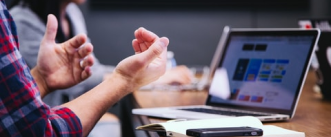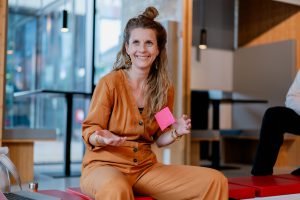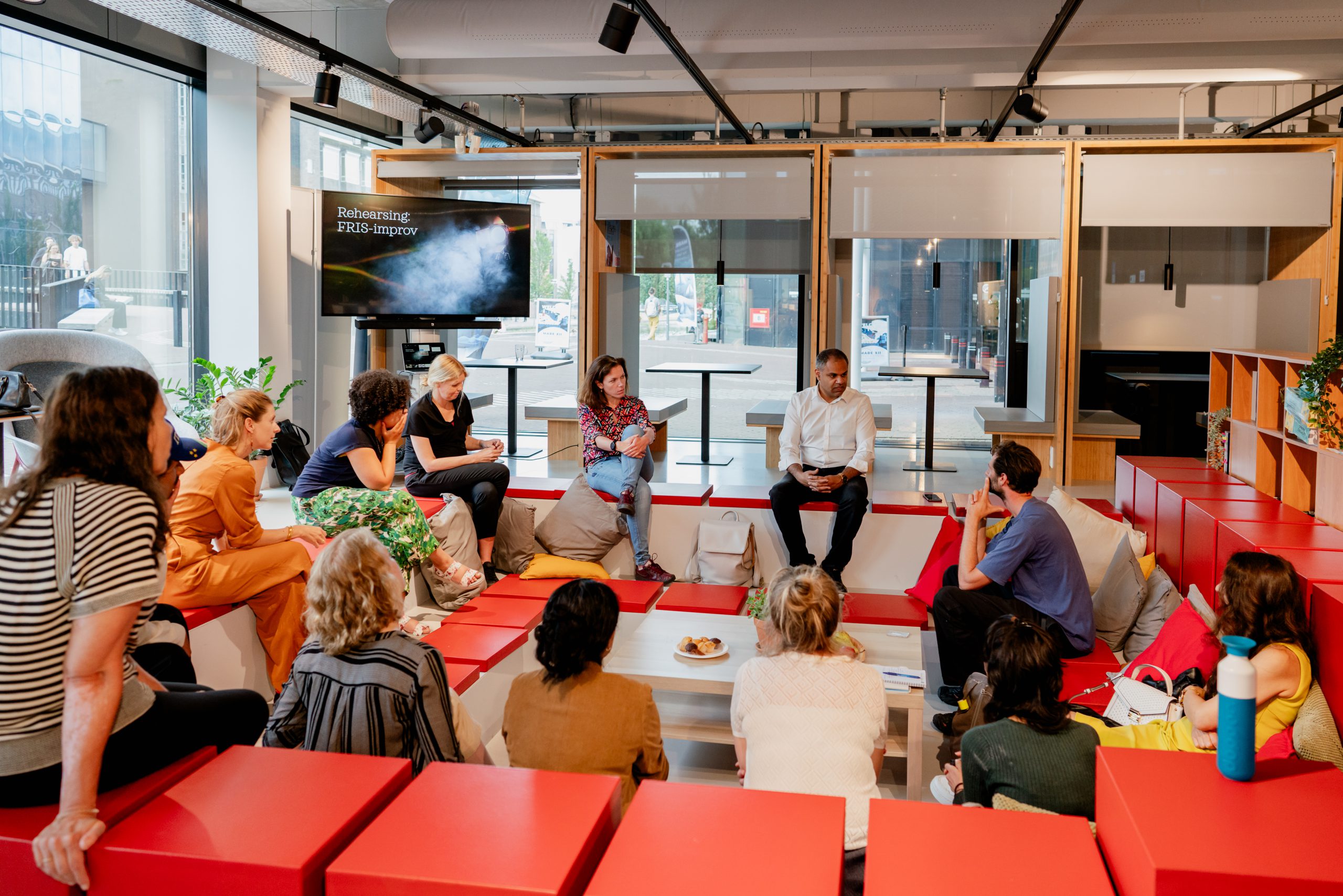
The fifth FRIS café: a growing community
On Thursday, June 28, we gathered for what was already the fifth FRIS cafe. These six-weekly gatherings provide grantees of the Fair, Resilient & Inclusive Societies (FRIS) theme grant the opportunity to come together, share ideas and get inspired. Led by educators Dr. Mieke Lopes Cardozo and Drs. Rosanne van Wieringen, it was an edition full of connections, theatre and even a bit of dancing. This article offers a reflection of a dynamic and inspiring afternoon.
Pits, dances and planes
Starting from 3pm, grantees slowly trickle into the UvA’s Law Hub. In this elongated space, everyone gathers at the back in ‘the pit’. This is a section situated at a lower level than the rest of the space that is enclosed by sofas. The pit literally and figuratively sets the stage for this afternoon.
Once all the grantees are in by 3.15pm, Mieke kicks off the session. In co-creation with Rosanne and Sneha – one of the FRIS grantees – she has prepared a special session with lots of game formats and reflection opportunities, but also with a glance into the future. Most importantly, the session begins by collectively developing a safe environment, she says. “Participation is possible in any role today. Sometimes you feel like engaging completely and sometimes you might not, and that’s all fine,.” ensuring that the present grantees are comfortable. And that, while a photographer moves around the group to capture the afternoon on camera as well. The grantees do not seem bothered by the camera and eagerly participate in the first exercises. First up, the programme includes a warm-up with a round of ‘Hey!’. Here, participants address each other with ‘“Hey!’“ while looking each other in the eye. It allows for eye contact, focus and connectivity and today it noticeably results in an open and inclusive atmosphere.
With this atmosphere, the grantees effortlessly blend into the first theatrical exercise of the afternoon. They are instructed to form a large circle. Taking turns, someone volunteers to step into the middle to act out a self-chosen emotion. Only when a second volunteer joins in and when there is a visible interaction between the two, the first person may return to the circle. Then, it’s the second volunteer’s turn to pick a new emotion and so the game continues. What we see are awkward greetings and people anxiously and hopefully waiting for a second volunteer to join them, but most of all, we see dancing, smiling faces and even imitations of planes (or birds?), freely and carelessly flying through the airspace of the Law Hub.
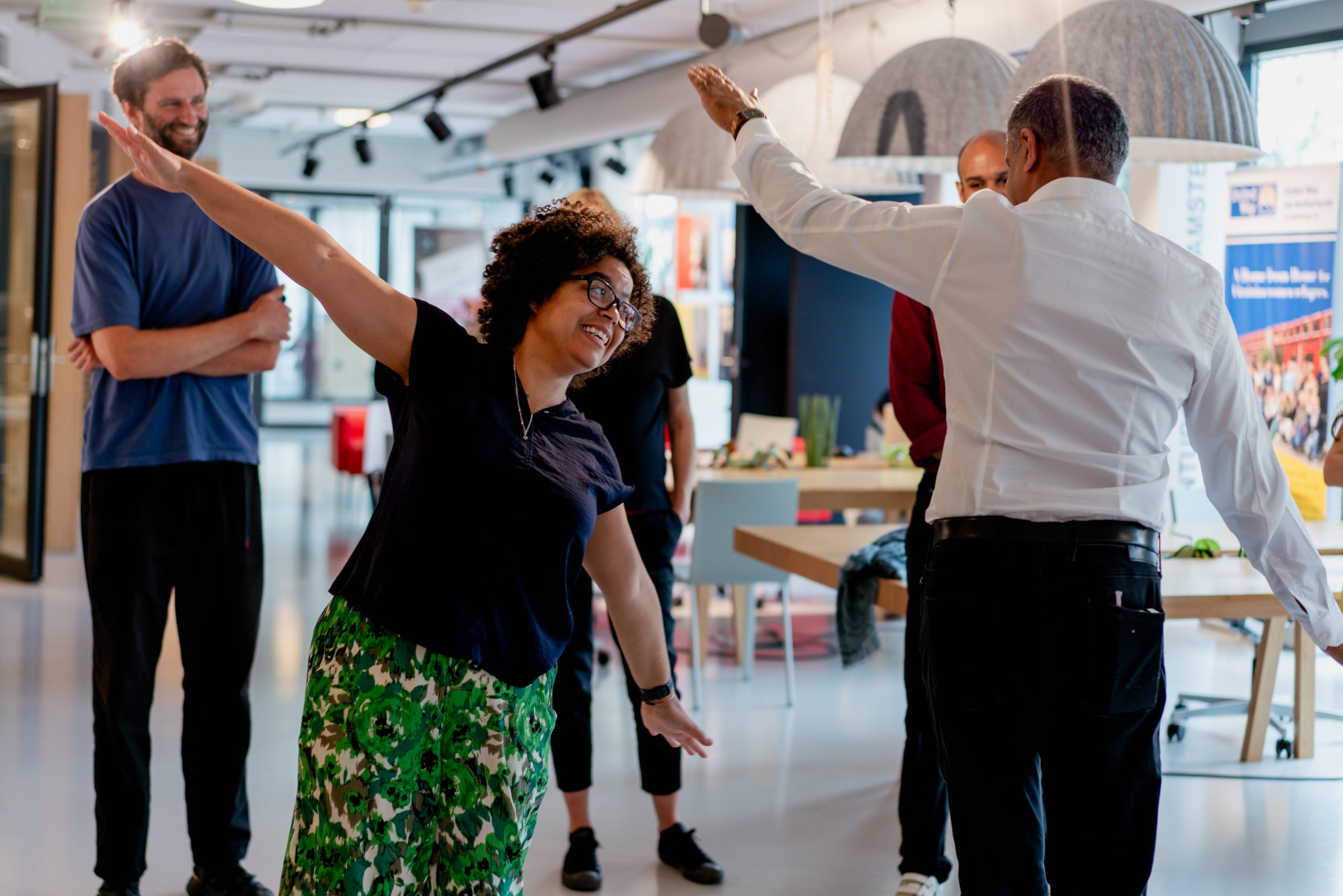
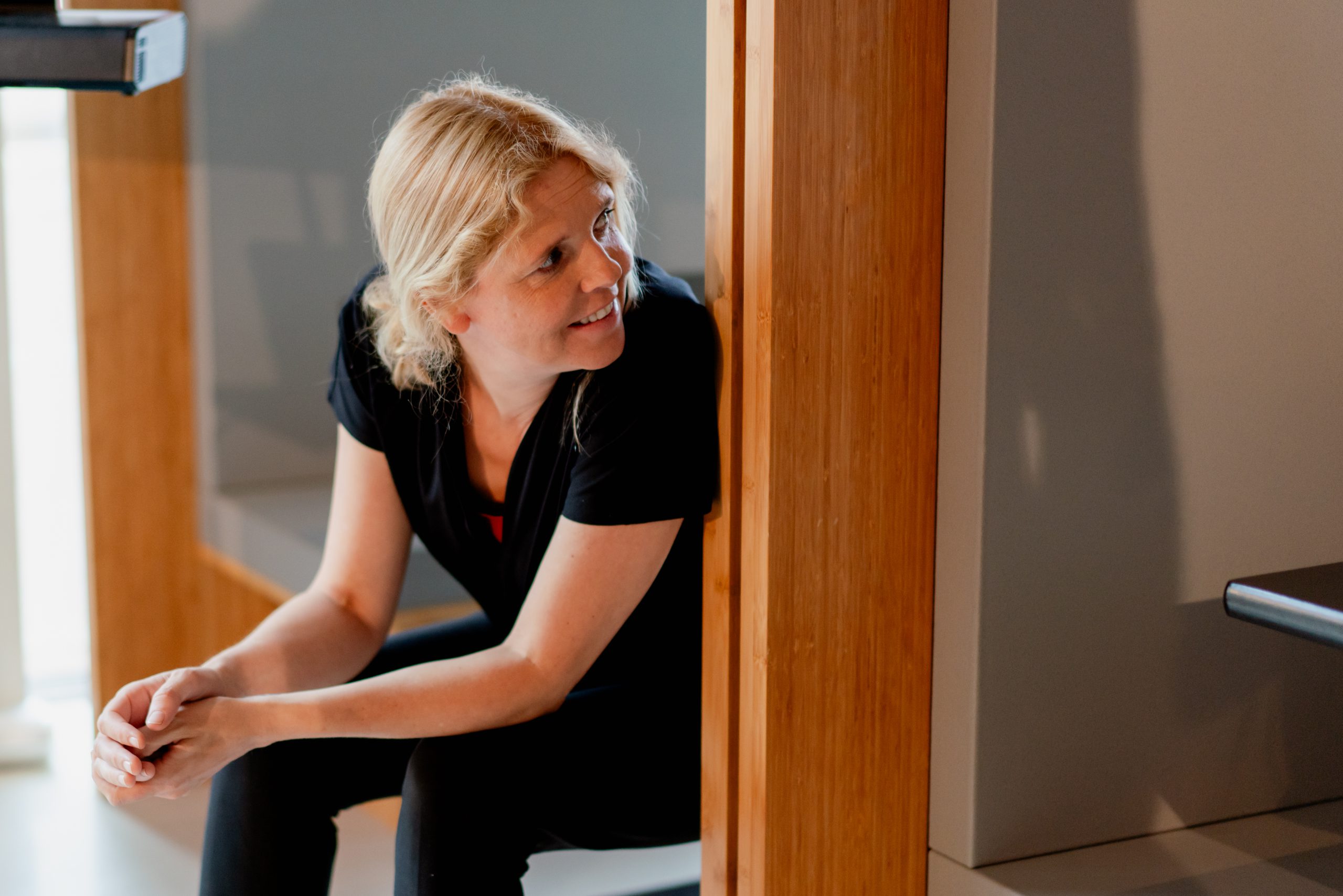
“What FRIS really means”
Now that everyone is warmed up, an improvisation exercise that is genuinely related to the FRIS grant awaits. The grantees have to work out a role-play in groups of three. Two people play potential grantees who have to use improvisation to create a new grant proposal. This proposal is presented to the third person, who plays a FRIS committee member and has to review the proposal after five minutes. The ‘potential grantees’ are repeatedly given the opportunity to complement each other with one addition to create a more complete proposal. This exercise helps grantees reflect on their communication with colleagues about FRIS projects and encourages them to think creatively from different perspectives. It leads to hilarity, but also draws the participants closer together and even produces some really good ideas. “These sessions and game formats help me understand what ‘FRIS’ really means and why this grant is so important,” explains one grantee.
After the break, the stage is set for a big plenary theatre exercise. When Mieke asks which volunteers would like to participate, hands go up hesitantly at first. Eventually, five grantees diligently work out a new role-play. Now the board of a fictitious failing bachelor’s must revive the education programme. Like trained actors, the grantees are fully absorbed in their roles, laughing, complaining, seeming desperate and finally coming to an agreement. The audience itself is not idle either, asking critical and analytical questions from predetermined perspectives. Again, it leads to reflection and new insights. “I can incorporate my own experiences in this play,” says one grantee. Another grantee agrees that the play is relatable. “In reality, some people at the university only consider their own role as well and do not care about the very values we promote with the FRIS grant. That’s why the things we do with the grant and during the FRIS cafes are so significant.”
The future of FRIS
After the excitement of the play, the session concludes on a calmer note back in the pit. Here, the grantees are given the opportunity to reflect on the origins, goals and direction of FRIS through a regenerative framework. First, they are asked to close their eyes. They are given a moment to visualise the origins and think about what FRIS means to them. When the eyes are opened again, they are asked to draw their vision on a post-it. The results are not just beautiful drawings but also illustrate the shared inclusive vision. For example, one grantee draws a spider web that connects us all. And another draws flowers. “The different types of flowers symbolise all the different individuals in this society, but we are all connected by the same soil and the same water we are given.” In the end, the grantees agree on being here because of the connection in their ideals, values and, above all, their empathy for others.
Based on this vision, the attendees also looked at the future of FRIS. “What we started is growing, this applies to our projects and to the community. Unfortunately, grants are still very competitive, when in fact we should share our resources,” someone explains. “FRIS can actually become a sustainable network, where sharing our knowledge is so valuable that people will want to take part in it. This is also shown by these meetings, where people keep coming back”, adds another. Everyone agrees that it should extend beyond this group of grantees. “You don’t see the FRIS values reflected in current scientific research and that needs to change. Like the grants, the entire education system is too performance-oriented. For students, it’s all about the grades, whereas we want to work together to build a network of inspirational resources. In this respect, it is essential that we remain mindful of the students. They are our pole star.”
Educator Mieke emphasises the message of the grantees and the value of the FRIS cafes. “There is always an element in the cafes that people can apply in their own work that is focused on education in, for and with society. We aim to enable them to do so by first providing a secure environment, this also develops a sense of community. And we can see that we are succeeding, grantees keep coming back and the community keeps on growing. The most important thing is that this community has its own place. And then, we intend to continue to grow; within the UvA and beyond. There’s even a FRIS festival coming up, so we’re by no means done here.”
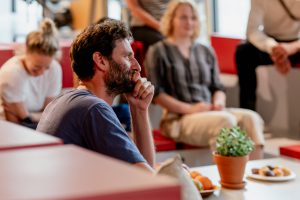
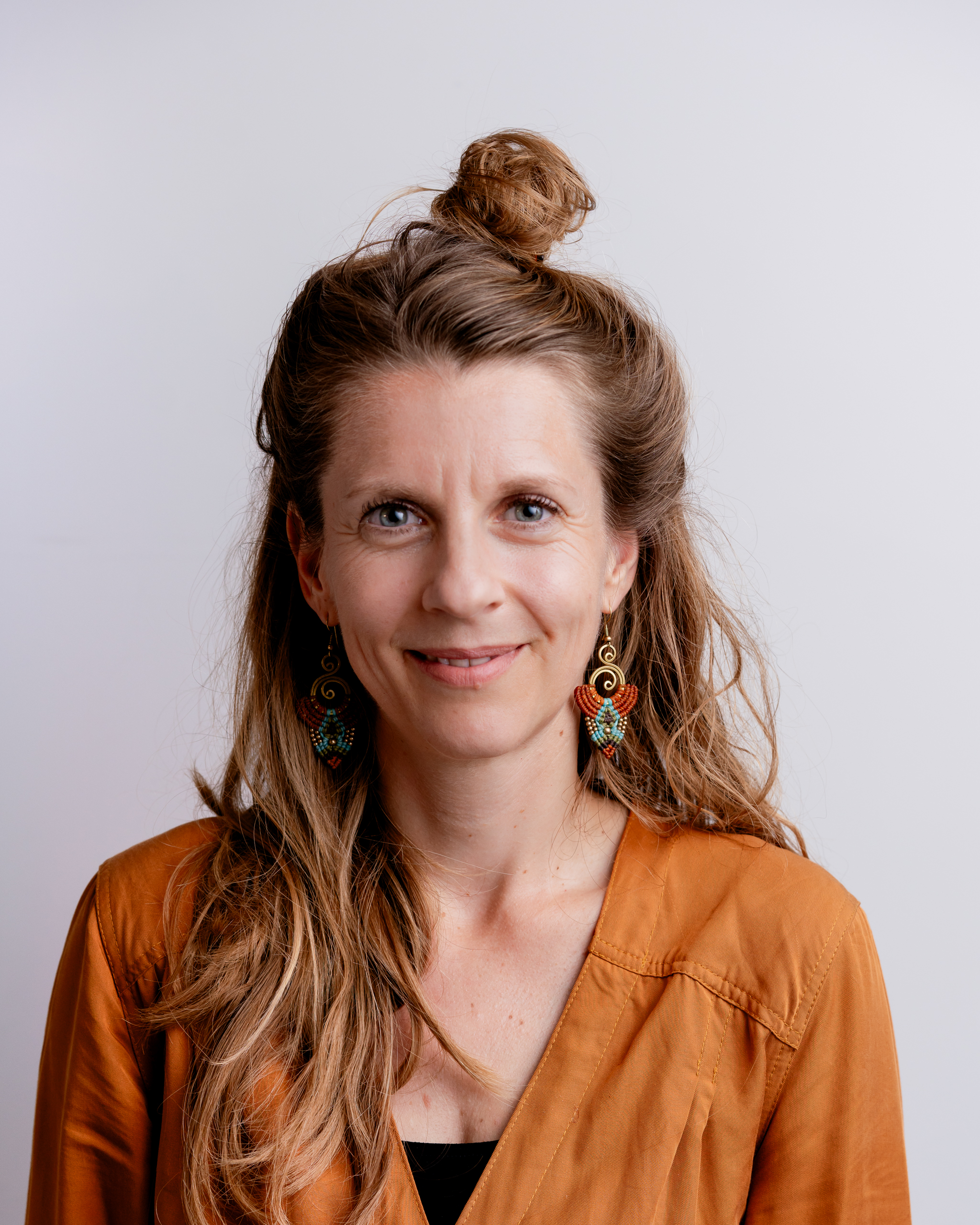
Mieke is a senior lecturer in Education and Inclusive Development at the Amsterdam Institute of Social Science Research, and part of the Governance and Inclusive Development Research Group of the University of Amsterdam. Mieke’s academic and transdisciplinary teaching, supervision and research focuses on the role of education in processes of regeneration, peacebuilding, social and gender justice and inclusive development in the contexts of Sri Lanka, Aceh/Indonesia, Bolivia, Myanmar and Higher Education in the Netherlands.
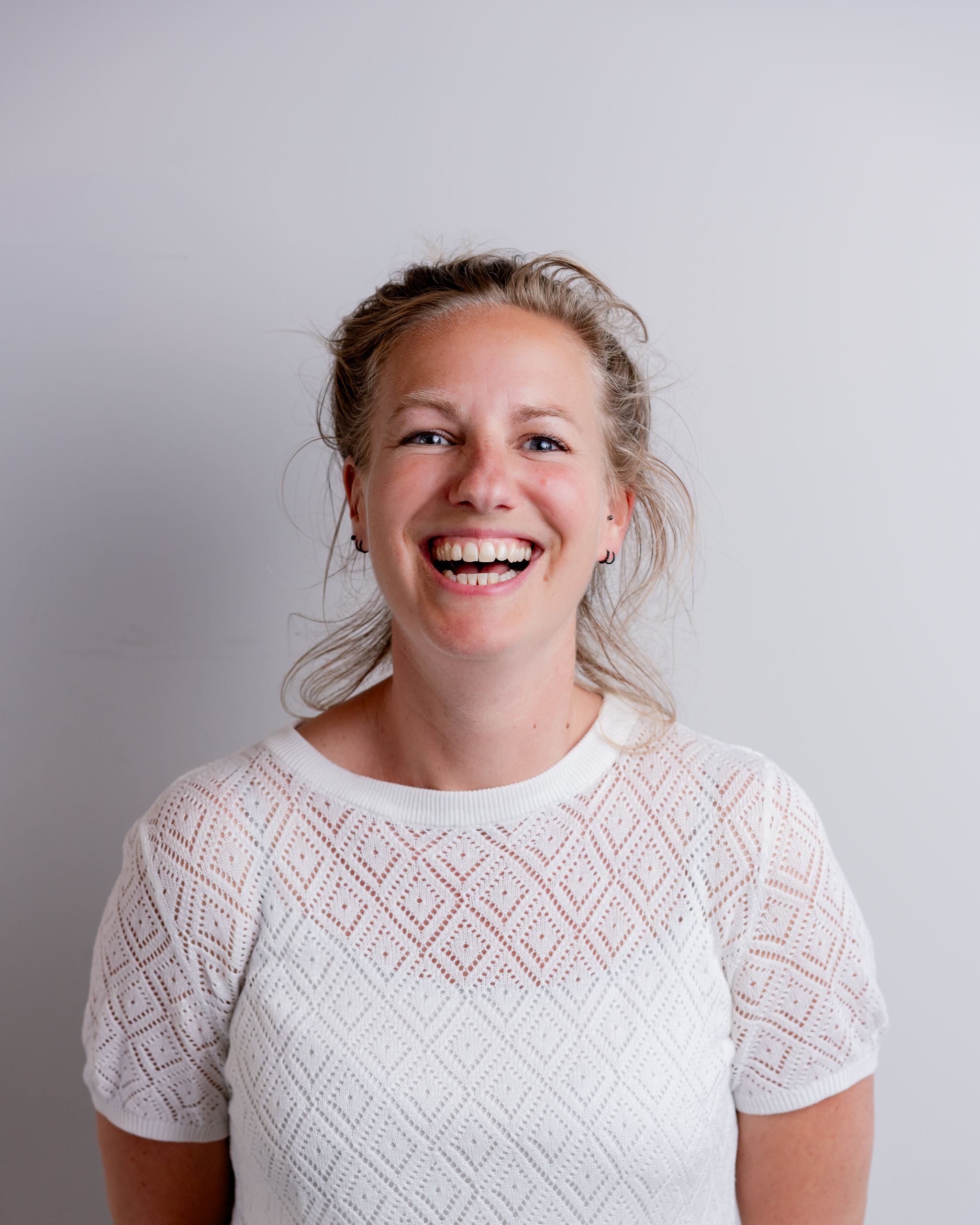
Rosanne is a teacher trainer at the central Teaching and Learning Centre and an education developer at the Institure of Interdisciplinary Studies. The education she develops and teaches focuses on transdisciplinary teaching initiatives. She also conducts evaluative education research on students’ experiences of transformative skills gained during transdisciplinary education. What characterises her work is the ambition to develop education that closes the gap between science and society.





